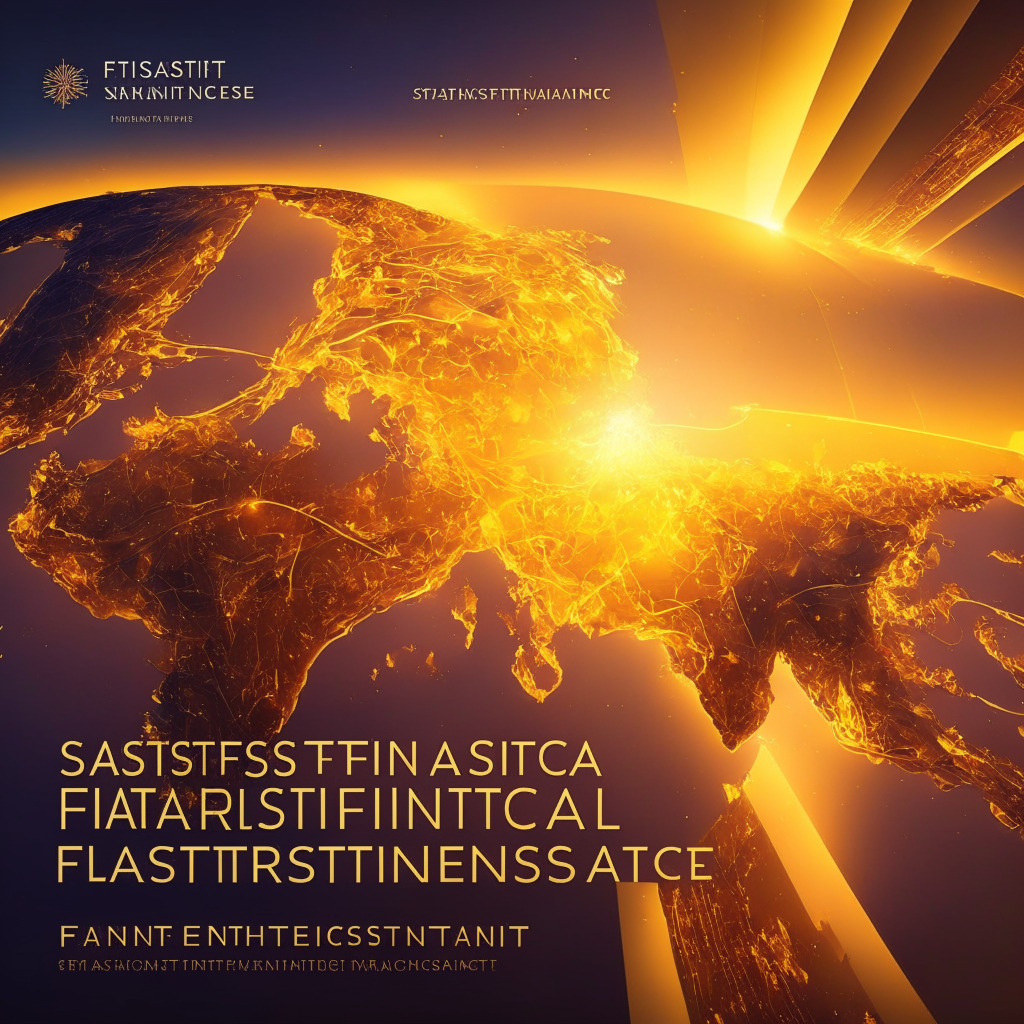Recent news highlights the dichotomy within the crypto industry – between regulators seeking oversight and proponents advocating decentralization. Examples include the dismissal of SEC’s case against Ripple Labs, new crypto-focused task forces in Hong Kong, changes in stablecoin oversight in Canada, and increased regulation in the UK.
Search Results for: UK Financial Conduct Authority
Navigating the Digital Asset Frontier: Can Traditional Finance Measures Secure Cryptocurrencies?
“The director of the Consumer Financial Protection Bureau, Rohit Chopra, recently shared that the bureau is contemplating applying the Electronic Fund Transfer Act (EFTA) to digital assets. This approach could minimize high losses often experienced from unauthorized crypto transactions and aim to establish safer environment for investors.”
Zumo’s Compliance with FCA Guidelines: Signifying Innovation and Commitment in Crypto Industry
Zumo, a digital asset-as-a-service platform, became the first cryptocurrency company to incorporate the Financial Conduct Authority’s new financial promotions technical flow guidelines. These rules aim to protect consumers investing in cryptocurrencies. Zumo’s adherence signifies commitment to regulation, user protection, and industry integrity.
Tottenham Hotspur Embraces Blockchain: Balancing Fan Monetization and Complex Regulations
Tottenham Hotspur embraces blockchain technology, partnering with the Chiliz blockchain to launch a Web3 fan token unlocking unique privileges. However, the absence of comprehensive blockchain token regulation presents potential challenges for fans and sport entities navigating this technology.
Google Cloud’s BigQuery Embraces Blockchain: Progressive Leap or Just A Data Grab?
Google Cloud’s data warehouse, BigQuery, has integrated data from 11 new blockchain networks. While seen as a move validating blockchain technology, skeptics view it simply as Google adding another databank. It also launched a feature simplifying blockchain queries, marking a growing focus on blockchain usability and partnerships within the sector.
Riding the Crypto Rollercoaster: Navigating the Bitcoin Crash Amid Regulatory Changes
In the constantly fluctuating cryptocurrency landscape, Bitcoin’s trading value has decreased significantly, influenced by big players or ‘whales’ offloading their stocks. With looming regulation tightening, exchanges like Luno are making adjustments to comply. It’s critical to stay informed and back your investments with thorough research and professional insight in this volatile market.
FCA Extends Crypto Marketing Compliance Deadline: Breathing Space or Consumer Risk?
“The UK’s Financial Conduct Authority could extend the deadline for crypto companies to comply with its marketing rules until January 8, 2024. This move underlines the need for crypto firms to provide transparent and honest marketing. Firms violating regulations could face strict penalties, including suspensions or removal of social media accounts.”
Exploring Crypto Facilities Potential in Reviving the Crypto Derivative Market after FTX’s Collapse
Crypto Facilities, associated with the crypto exchange Kraken, is planning to expand its diversity of client asset custody services but it requires expansion of its multilateral trading license. CEO Mark Jennings projects it may take six to twelve months for such implementation.
Navigating the Shifting Regulatory Landscape: Crypto Advancement vs Anti-Money Laundering Measures
The Financial Conduct Authority (FCA) of the U.K. has detailed new rules to combat crypto money laundering, including the controversial ‘travel rule’, which requires crypto operators to identify both sender and recipient in fund transfers. Despite industry concerns, the FCA emphasizes these regulations’ role in preventing crypto from becoming a veil for criminal funds.
Binance Connect’s Shutdown: Reflection on Regulatory Challenges in Crypto’s Growth Journey
“Binance Connect, a regulated crypto trading platform, is shutting down due to their provider discontinuing card payment service. Despite significant adaptation strategies and growth to a broad blockchain ecosystem, Binance faces ongoing regulatory complexities and issues, indicating an intricate, evolving landscape for crypto businesses.”
Regulatory Revolution: Bank of England’s Approach to Systemic Stablecoins and its Potential Impact
The “Payments Regulation and the Systemic Perimeter” framework introduced by the Bank of England specifies regulations for systemic stablecoins. The framework outlines collaboration among multiple regulatory bodies, with the Bank of England holding veto power over potential actions against important institutions. The goal is to enable safe adoption of crypto and establish a well-regulated future for systemic stablecoins.
Cryptocurrency Developments: Binance Licenses, Coinbase Buybacks, and More Unraveled
“Binance receives licenses from Central Reserve Bank and National Commission of Digital Assets in El Salvador fostering financial inclusion. Coinbase proposes buying back $150m of its bonds eliciting mixed investor sentiment. Bitstamp seeks to expand operations, reminding of crypto investment risks.”
Scaling Up: Bitstamp Exchange’s Bold Global Expansion Strategy and Its Market Impact
Bitstamp, a prominent crypto exchange, is reportedly fundraising for an aggressive growth strategy that includes launching new products and services, scaling operations, and expanding in the European, Asian and UK markets. However, the exchange emphatically declares it isn’t for sale.
Unmasking the FCA’s Digital Sandbox: Breeding Ground for Fintech Innovation or Big Brother?
The UK’s FCA transitions from trial to success, unveiling a permanent version of its Digital Sandbox on 1 August 2023. The sandbox provides resources like data sets, APIs, and security protections to firms, aiding technological testing and inviting wider involvement from innovative businesses, start-ups, and data providers. This innovation also supports a range of digital asset use cases and fintech products, ensuring a secure environment for experimental concepts.
Exploring Blockchain: A Tale of Regulations, Innovations, Crimes and Expansions
The UK government has rejected proposals to regulate unbacked cryptoassets as gambling, voicing concerns about global misalignment. In contrast, Kuwait’s CMA has outright banned all crypto operations. Meanwhile, the FCA is launching a digital sandbox for crypto innovation. Globally, crypto-related crimes and regulations continue to evolve, with growing interest in Middle East expansion.
FCA’s Sandbox: An Innovation Playground or a Risky Experiment for Blockchain Technology?
The U.K. Financial Conduct Authority is offering firms access to a digital sandbox for testing their products’ early-stage performance. The sandbox provides datasets, APIs, and data security protection. This initiative helps firms evaluate products, supports various digital-asset use cases and fosters an ecosystem of integration within the digital economy. The sandbox’s broader availability piques crypto enthusiasts’ interest, prompting discussions around blockchain technology’s future.
Social Media Influencers & Crypto Promotion: A Delicate Balance of Innovation, Regulation, and Responsibility
“The intertwining of social media influencers and cryptocurrency promotions is under scrutiny by the U.K.’s Financial Conduct Authority. Influencers promoting financial products may encounter issues with financial advertising rules. This includes ‘illegal financial promotion’ where influencers disseminate financial promotions without approval from an authorized person, potentially leading towards unfair and misleading promotions.”
FCA Leadership Shift: Impact on Crypto Regulation and Industry Future
Binu Paul, former head of digital assets at the FCA, leaves the organization after nine months, and Victoria McLoughlin steps in as interim Head of Market Interventions for digital assets. This leadership change occurs amid the FCA’s intense focus on regulating the emerging crypto industry and enforcing stricter advertising rules for crypto services. McLoughlin’s experience at the FCA signals a continued stable approach to cryptoasset regulation.
Uncovering the Binance Ltd Mystery: Shell Companies in the Crypto World – Legit or Not?
A recent finding revealed Binance Ltd and 2,400 other companies were registered under the same address in the UK. Binance clarified that Binance Ltd was not affiliated with their exchange. Shell companies are notorious for concealing ownership and illegal activities, but they also serve legitimate purposes like privacy protection, tax planning, and real estate investments.
Binance Fends Off Scams: Importance of Due Diligence in Crypto Landscape
Binance issued a cease and desist order to a fraudulent company, Binance Ltd, which falsely claims affiliation with the cryptocurrency exchange. This incident highlights the importance of due diligence and caution when navigating the crypto landscape, amidst scammers seeking to profit from the thriving sector.
Binance’s European Exodus: Sign of Sinking Ship or Resilient Adaptation?
Binance, the world’s largest crypto exchange, faces legal complications with global financial watchdogs, leading to key European executives departing the company. This raises questions about Binance’s long-term stability in the European market and highlights the importance of market research before investing in cryptocurrencies.
IMF’s Role in the Future of CBDCs: Pros, Cons, and Global Regulatory Debate
The IMF is working on a global infrastructure for interoperability between central bank digital currencies (CBDCs) to prevent underutilization. Meanwhile, France’s AMF advocates globally coordinated rules for DeFi, and Ethereum developers consider raising the maximum validator balance for network efficiency.
Binance Struggles with Global Regulatory Scrutiny: Challenges and Crypto Market Stability
Binance, the world’s largest crypto exchange, faces increasing regulatory scrutiny in several countries, resulting in withdrawal from UK, Dutch, and Cypriot markets. This highlights the challenges exchanges face while navigating the complex global regulatory landscape and balancing innovation with investor protection.
Binance’s Regulatory Dilemma: Compliance Cooperation or Struggles to Maintain Operations?
The UK’s FCA has cancelled permissions granted to Binance Markets Limited, following the company’s request. Binance is adapting to changing regulations by focusing on fewer European jurisdictions. As regulatory scrutiny increases, crypto exchanges must balance innovation and compliance to stay competitive and protect customers.
Hong Kong’s Crypto Hub Dreams: Major Banks’ Reluctance vs HKMA Pressure
Hong Kong aims to become Asia’s crypto hub, but major banks like Standard Chartered and HSBC hesitate due to money laundering fears. The Hong Kong Monetary Authority is pressuring banks to onboard crypto exchanges, while banks struggle to balance supporting clients and avoiding potential risks.
Hong Kong Welcomes Crypto Exchanges: Coinbase Explores Global Expansion Amid Regulatory Challenges
Hong Kong welcomes global virtual asset trading operators, including Coinbase, with the region’s Securities and Futures Commission (SFC) accepting crypto trading platform license applications. This move offers potential growth and friendlier regulations amid increasing scrutiny on cryptocurrency exchanges in the United States and other countries.
Andreessen Horowitz’s London Expansion: Pros, Cons, and the Future of Crypto Regulation
Andreessen Horowitz (a16z) is opening its first office outside the U.S. in London, aiming to capitalize on a predictable business environment and welcoming stance toward blockchain technology. The firm will also launch a Crypto Startup School program in Spring 2024 and collaborate with U.K. universities to promote blockchain education.
The Battle Over Crypto Ads: Tech Giants vs European Regulators and Consumer Advocacy Groups
The European Consumer Group (BEUC) has lodged a complaint with the European Commission regarding tech giants like Meta and Alphabet, urging stricter crypto advertising policies in the EU due to concerns about potentially misleading ads on platforms like Instagram, YouTube, TikTok, and Twitter. The group seeks better protection against crypto scams and false promises.
FCA’s New Crypto Marketing Rules: Balancing Consumer Protection and Blockchain Innovation
The UK’s Financial Conduct Authority (FCA) is finalizing cryptocurrency marketing rules to balance consumer protection and innovation. New regulations require clear risk warnings, non-misleading advertisements, and a 24-hour cooling-off period for first-time investors. The FCA aims to strengthen investor confidence and mitigate risks in the growing crypto market.
EBA Proposes Expanded Crypto Risk Guidelines: Impact on CASPs and the Future of Regulation
The European Banking Authority (EBA) proposes expanding its money laundering and terrorist financing risk factor guidelines to include crypto-asset service providers (CASPs), emphasizing factors indicating higher or lower risk exposure. Associated risks include crypto-to-fiat exchanges, darknet activities, and crypto mining in high-risk jurisdictions. CASPs are urged to adjust their customer due diligence accordingly.
Crypto Regulation Showdown: Balancing Innovation & Investor Protection in a Decentralized World
The International Organization of Securities Commissions (IOSCO) seeks public comment on policy recommendations for crypto and digital asset markets, addressing market abuse, client asset protection, and disclosures. Their Fintech Task Force aims to establish a regulatory agenda for fintech and cryptocurrency industries, with oversight from the Monetary Authority of Singapore. Recent events highlight the need for increased regulation, and IOSCO’s initiative seeks to create a more secure environment in the digital asset industry.
South Korea Raid on Crypto Exchanges: Regulation vs. Market Growth Debate Heats Up
South Korean prosecutors raided crypto exchanges Upbit and Bithumb in connection with lawmaker Kim Nam-kuk’s digital assets investigation. Amid allegations of suspicious crypto dealings and resignation, South Korea continues efforts to regulate and monitor cryptocurrency activity, ensuring legal compliance and user safety.































